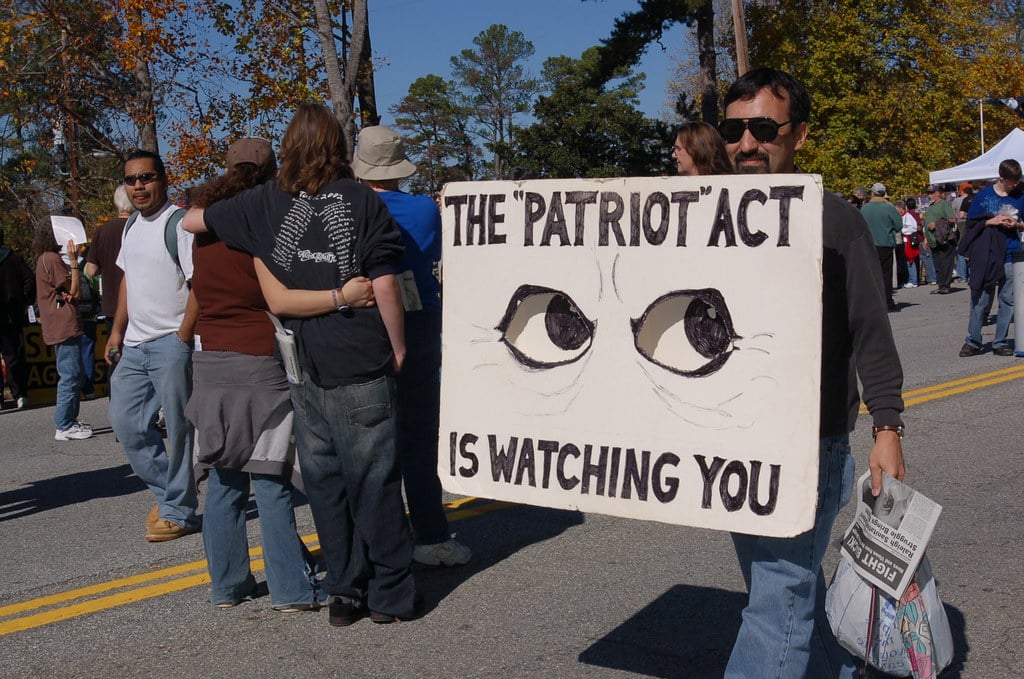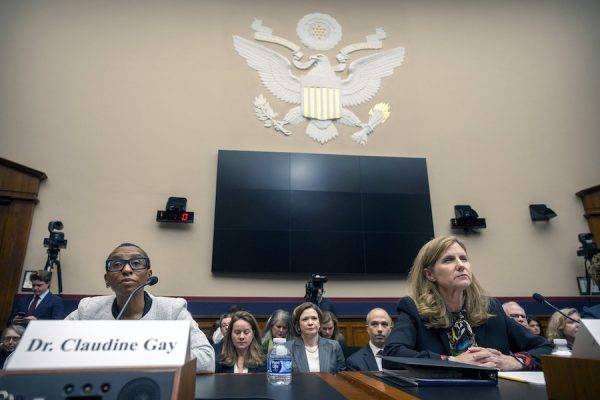Editors’ Note: In 2004, Elaine Scarry described in Boston Review how the Patriot Act inverts the Constitution’s commitment to government transparency and citizen opacity. Laws and official actions, Scarry explained, are to be visible for all to see, while individual lives are to be out of government’s sightlines. With the recent revelation that the National Security Agency, following authority supposedly granted by the Patriot Act, has been secretly collecting information on millions of Americans, Scarry’s idea has been echoed by numerous observers and reporters, such as Glenn Greenwald. What follows is an excerpt from her 2004 story, Resolving to Resist.
If many members of Congress failed to read the Patriot Act during its swift passage, it is in part because that act is almost unreadable. The Patriot Act is written as an extended sequence of additions to and deletions from previously existing statutes. In making these alterations, it often instructs the bewildered reader to insert three words into paragraph X of statute Y without ever providing the full sentence that is altered either in its original or its amended form. Only someone who had scores of earlier statutes open to the relevant pages could step painstakingly through the revisions. On the issue of electronic surveillance alone, the Patriot Act modifies the Electronic Communications Privacy Act, the Foreign Intelligence Surveillance Act, the Cable Act, the Federal Wiretap Statutes, and the Federal Rules of Criminal Procedure. Reading the Patriot Act is like being forced to spend the night on the steps outside the public library, trying to infer the sentences in the books inside by listening to hundreds of mice chewing away on the pages.
The hundreds of additions and deletions do, despite appearances, have a coherent and unitary direction: many of them increase the power of the Justice Department and decrease the rights of individual persons. The constitutional rights abridged by the Patriot Act are enumerated in the town resolutions, which most often specify violations of the First Amendment guarantee of free speech and assembly, the Fourth Amendment guarantee against search and seizure, the Fifth and Fourteenth Amendment guarantees of due process, and (cited somewhat less often) the Sixth and Eighth Amendment guarantees of a speedy and public trial and protection against cruel and unusual punishment.
The unifying work of the Patriot Act is even clearer if, rather than summarizing it as an increase in the power of the Justice Department and a corresponding decrease in the rights of persons, it is understood concretely as making the population visible and the Justice Department invisible.
The Patriot Act inverts the constitutional requirement that people’s lives be private and the work of government officials be public; it instead crafts a set of conditions in which our inner lives become transparent and the workings of the government become opaque. Either one of these outcomes would imperil democracy; together they not only injure the country but also cut off the avenues of repair.
When we say that democracy requires that the people’s privacy be ensured, we do not mean that our lives remain secret; we mean instead that we ourselves individually control the degree to which, and the people to whom, our inner lives are revealed. From Griswold v. Connecticut (l965) to the recent Lawrence v. Texas (2003), the Supreme Court has affirmed that privacy is a fundamental constitutional value and located its roots in the First, Third, Fourth, and Fifth Amendments. In an elegant summary of the underlying theory, the constitutional scholar Kenneth Karst has argued that privacy has a three-part architecture. Privacy means first of all “informational privacy”—control over personal information and judgments. Such privacy is in turn the basis of a person’s capacity for friendship and intimacy. It is also the foundation of moral autonomy and liberty, since freedom is premised on making important decisions based on independent judgment. Inhabitants of a country who lose the guarantee of privacy also eventually lose the capacity for making friends and the capacity for political freedom.
As necessary to democracy as this nontransparency of persons is the transparency of government actions. Because we have, for the past three decades, focused so intensely on the constitutional guarantee of personal privacy but not on the corresponding requirement of the non-privacy (or publicness, or publication) of the acts of governors, it is useful now to recall how many times the United States Constitution pauses to require the act of creating of an open record: “Each house [of Congress] shall keep a Journal of its Proceedings, and from time to time publish the same” with “the Yeas and Nays of the Members . . . entered on the Journal” (Article I, Section 5); a roll-call vote, recording not just numbers but names, is required when Congress overrides a presidential veto (I, 7); “a regular Statement and Account of the Receipts and Expenditures of all public Money shall be published from time to time” (I, 9); presidential objections to a piece of legislation must be forwarded to the house in which the legislation originated and published in their journal (I, 7); every congressional vote, with the exception of a vote on adjournment, “shall be presented to the President” (I, 7); the counting of the Electoral College votes must take place in the presence of the full Congress (II, 1; Amendment 12); the president is authorized to require the “Opinion in writing, of the principal Officer in each of the executive Departments” (II, 2); the president “shall from time to time give to the Congress Information of the State of the Union, and recommend to their Consideration such Measures as he shall judge necessary and expedient” (II, 3); treason proceedings will take place in “open Court” (III, 3) and criminal prosecutions in a “public trial” (Amendment 6). Unlike Article I (on the Congress) and Article II (on the presidency), Article III (on the courts) does not specify the keeping of records; but the fact that such open record-keeping is assumed is indicated by the opening clause of Article IV (on the states): “Full Faith and Credit shall be given in each State to the public Acts, Records and judicial Proceedings of every other state.”
The obligation of each branch to make its actions public—to make them visible both to the population and to the other branches—is often construed as a right belonging to the population, the right of access to information or “freedom of information,” and is closely bound up with First Amendment protections of free speech. Though scholars and jurists disagree about the extent to which access to government information is guaranteed by the Constitution (as well as by subsequent legislative acts, particularly the Freedom of Information Acts of 1966 and the later 1972–1978 statutes), it is hard to disagree with the stark argument—made with particular force by Alexander Meiklejohn and Cass Sunstein—that democratic deliberation is impossible without this access to information: “If information is kept secret, public deliberation cannot occur.” Secrecy, continues Sunstein, “is inconsistent with self-rule.” (Or, as the local resolution of Astoria, Oregon, recently phrased it, “Secrecy . . . undermines established norms for civil discourse between government and those it would govern.”) Sunstein identifies citizen deliberation as the primary benefit of open government, but he also identifies other benefits, including “checks and balances” (one branch cannot check the other if it does not know what the other is doing), “deterrence” (national security may actually be strengthened by open revelation of the country’s resources), and “sunlight as disinfectant” (if deliberations are carried out in secret, “participants may be less careful to ensure their behavior is unaffected by illegitimate or irrelevant considerations”).
The double requirement—that people’s lives be private and government actions be public—is turned inside out by the Patriot Act. The inner lives of people are made involuntarily transparent by provisions that increase the ability of federal officers of the executive branch to enter and search a person’s house (section 213), to survey private medical records, business records, library records, and educational records (sections 203, 215, 218, 219, 358, 507, 508), and to monitor telephone, e-mail, and Internet use (section 216). Simultaneously, the Patriot Act obscures executive-branch actions, hiding those actions from the population and from the legislative and judicial branches, and doing so before, during, and after the executive actions are carried out. One provision lowers the standards for “probable cause” (the need to show the courts evidence of a crime) to monitor a phone or computer, thereby almost releasing the executive branch from judicial supervision, a key feature of the constitutional checks and balances (section 216). Another provision releases the government from the obligation to inform a person that her house is about to be searched; it permits delayed notification of seven days and continual postponement thereafter (section 213). Another provision releases the CIA from its obligation to submit intelligence reports to Congress, instead allowing the secretary of defense, the attorney general, or the CIA director to defer the date of reporting (section 904).
The goal of making the actions of the executive branch opaque is carried out not only by the content of the Patriot Act, but by its form—its lengthy and difficult to comprehend list of revisions to scores of previously existing laws. The Patriot Act empowers the executive branch while obscuring the features of that empowerment. Some of the 238 local resolutions focus explicitly on the Patriot Act’s unwieldy form: Blount County, Tennessee, observes that it contains 1,016 sections; Philadelphia and San Mateo, California, both note its extensive page length; Philadelphia registers the absence of congressional hearings or markup sessions during its rapid passage; Amherst, Massachusetts, complains that it was “passed hurriedly”; and the Alaskan city of North Pole observes that such “sweeping legislation required intense public review and comment before it was passed.” Librarians and other ardent readers have from the outset recognized the importance of making the act lucid and have therefore played a pivotal role in the resistance to it, a subject that will return later.
The content of the Patriot Act is the principal concern, however. And while it may look like a ticker tape of tiny revisions in the phrasing of previous laws, the content of the Patriot Act goes to the core of our political life: it distorts not just this or that particular feature of governance but the basic act of self-governance itself. Because the privacy of individual action and the publication of government action are both necessary to democratic self-rule (that is, to the debate, deliberation, and decision-making on which self-rule is premised), the major complaint of the local resolutions has been the damage done to the liberties of persons and to the integrity of our laws. The most high-keyed formulation of this worry comes at the conclusion of Blount County’s resolution, which calls on all residents to study the U.S. Constitution so that they can resist not only the executive acts that have already been formulated but those that may come in the days ahead: “to study the Bill of Rights so that they can recognize and resist attempts to undermine our Constitutional Republic . . . and declare null and void all future attempts to establish Martial Law, [or] Declared States of Emergency.” While most of the other 237 local resolutions are more measured in their language, the documents consistently register the view that both the people and the laws of the country are endangered. Together the local resolutions constitute a treatise on self-governance and the rule of law.








